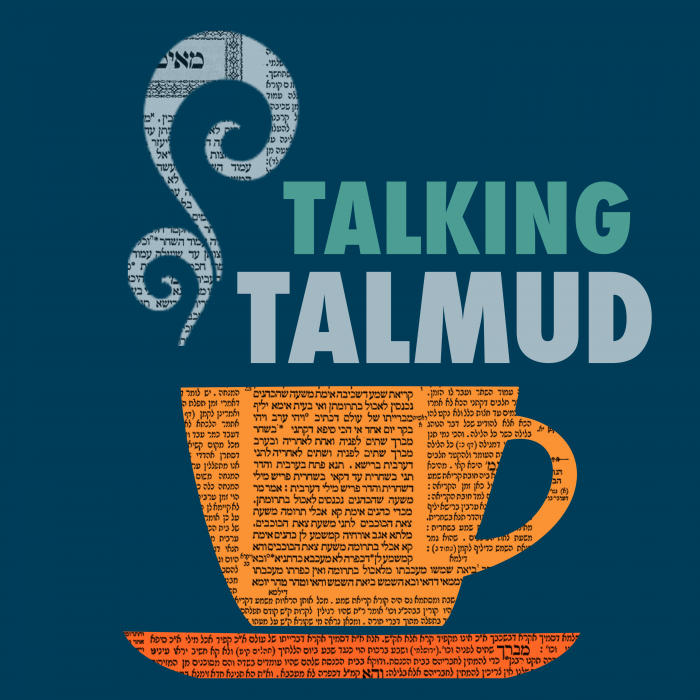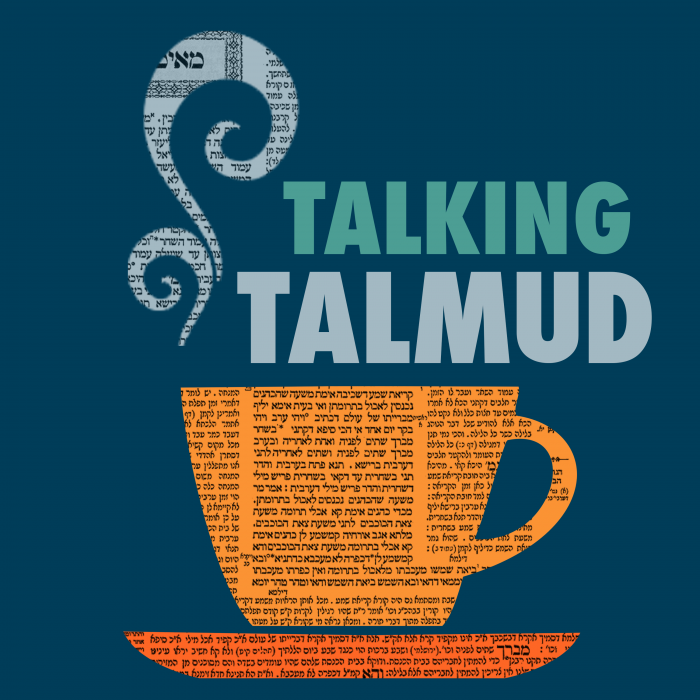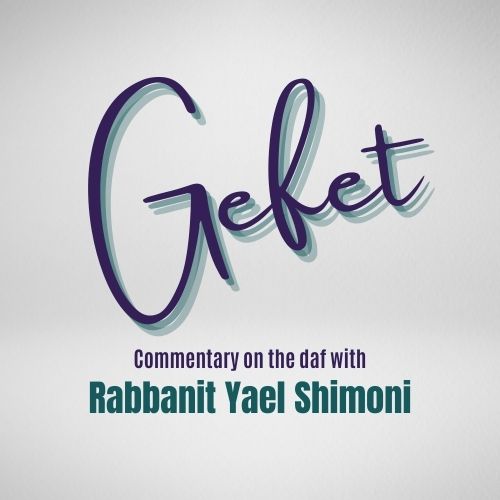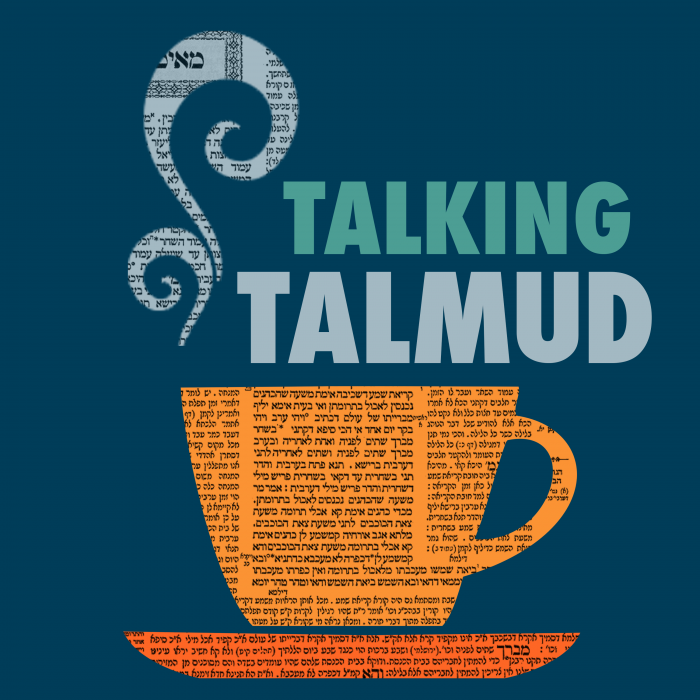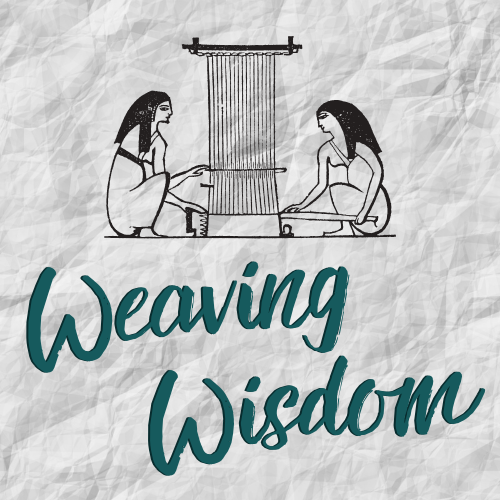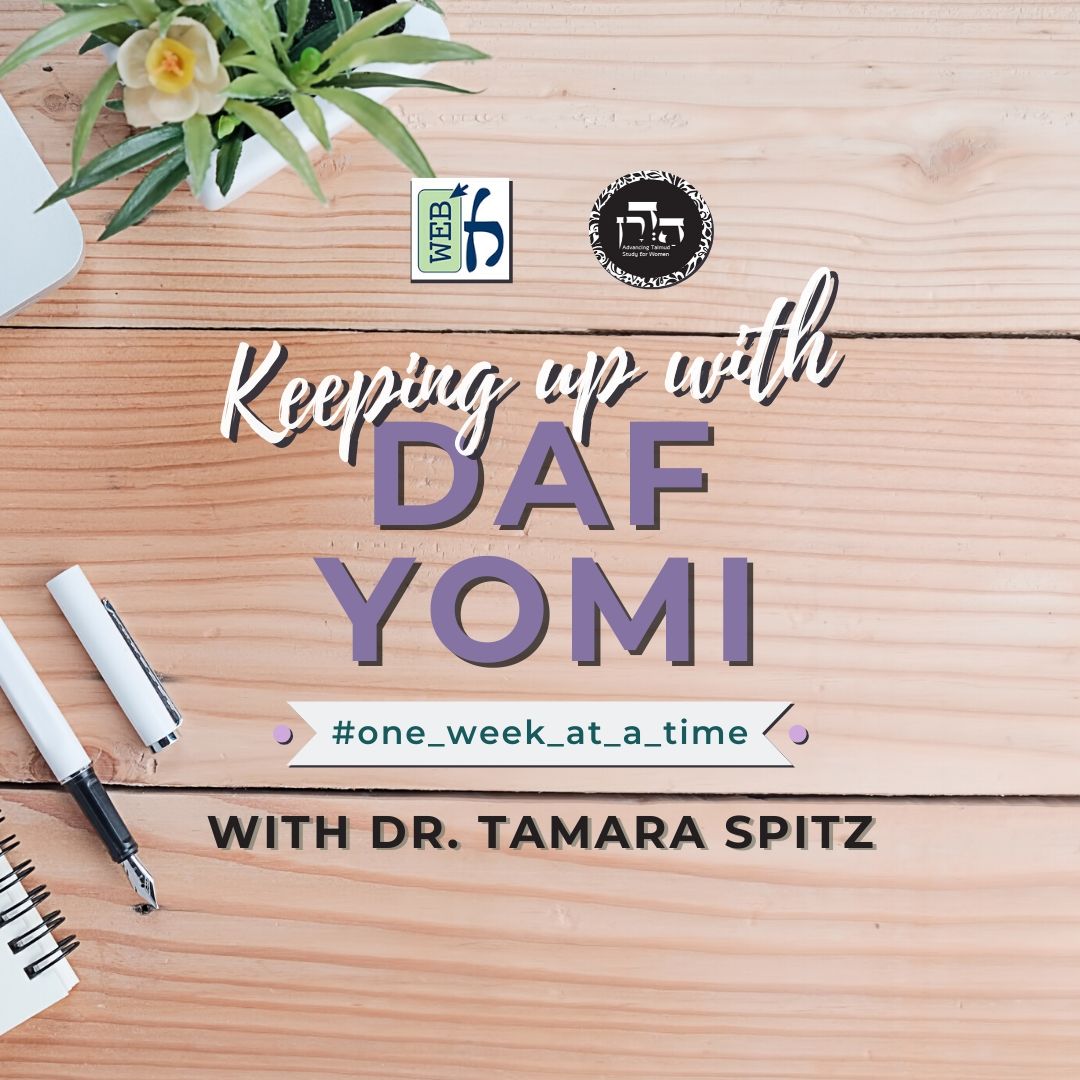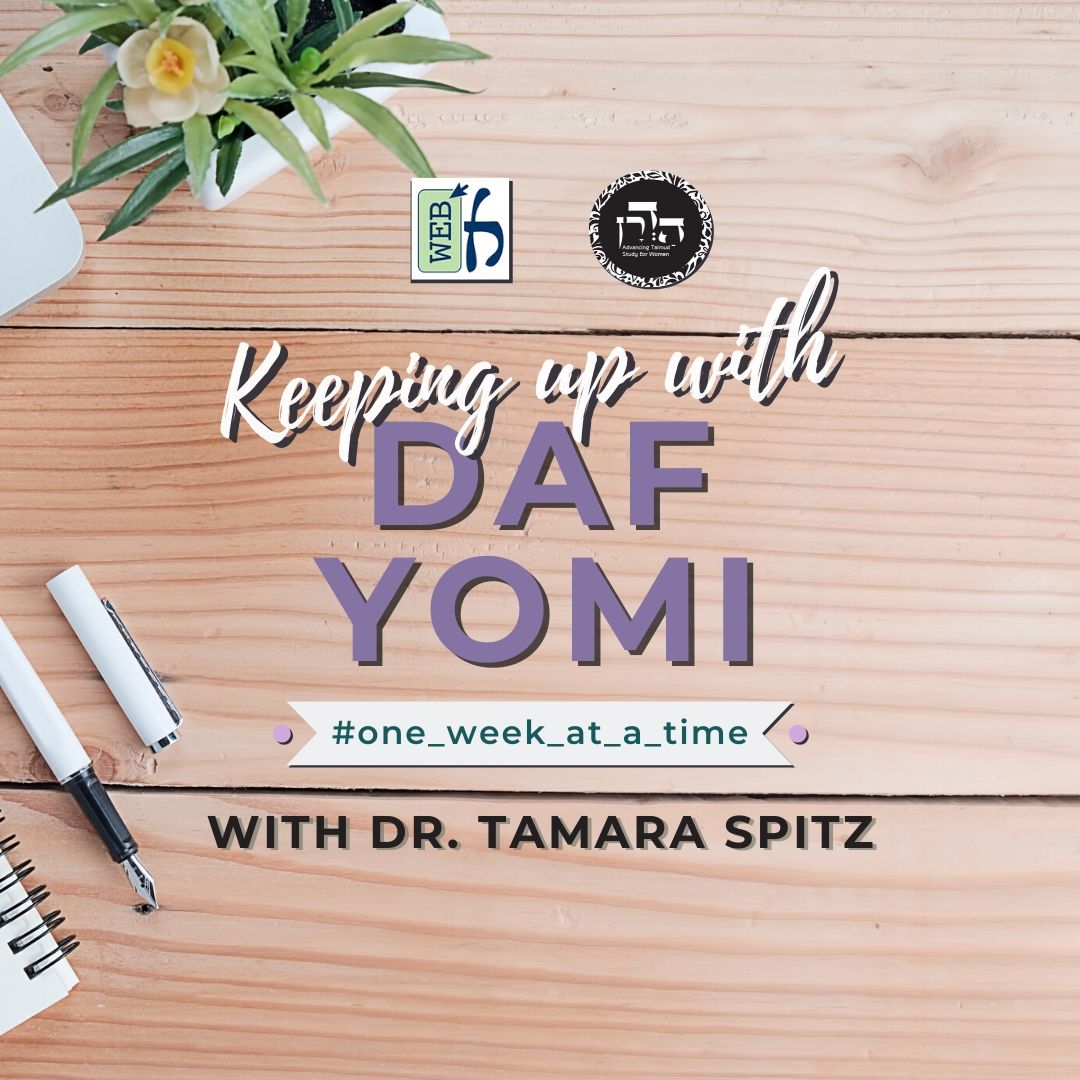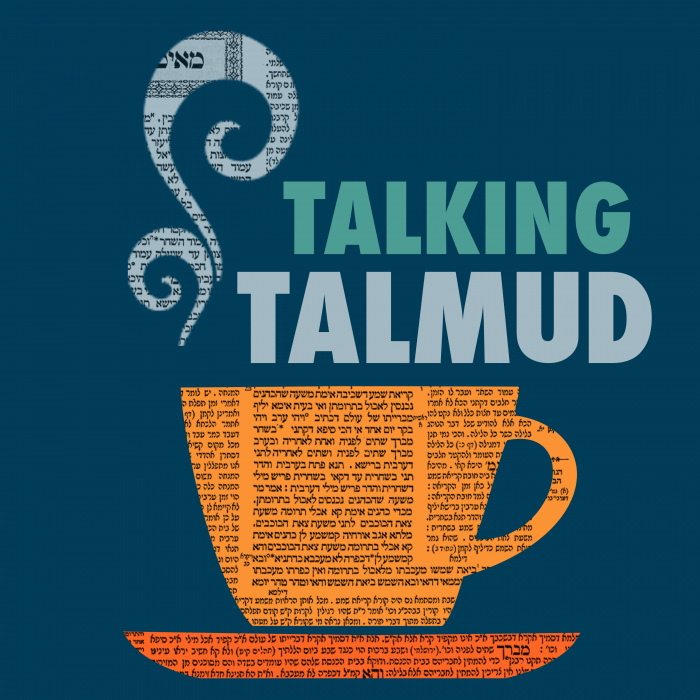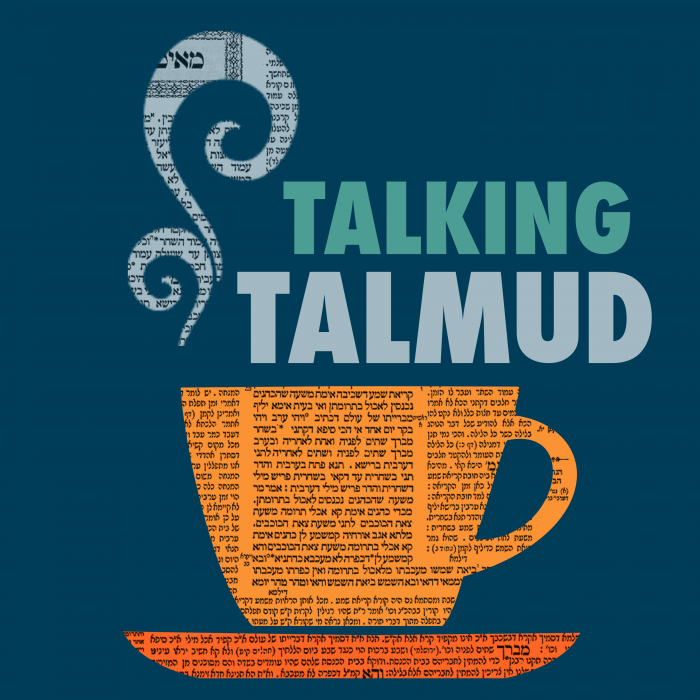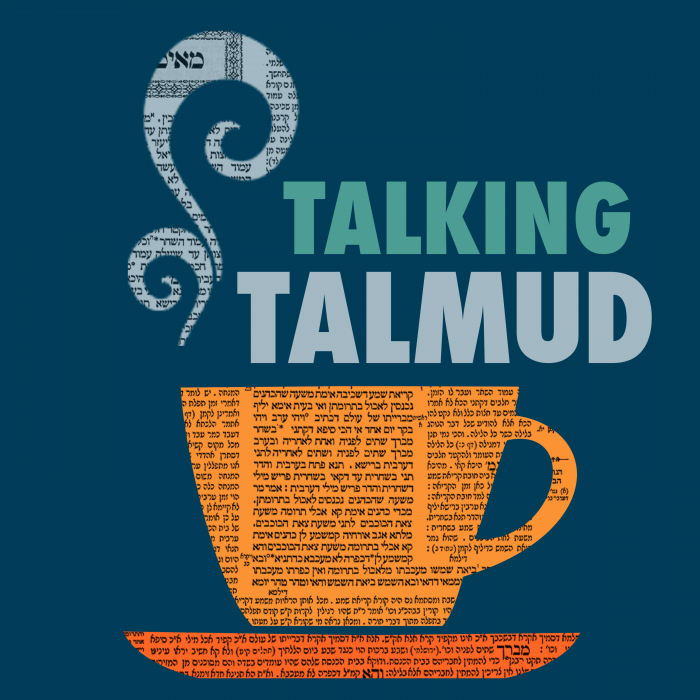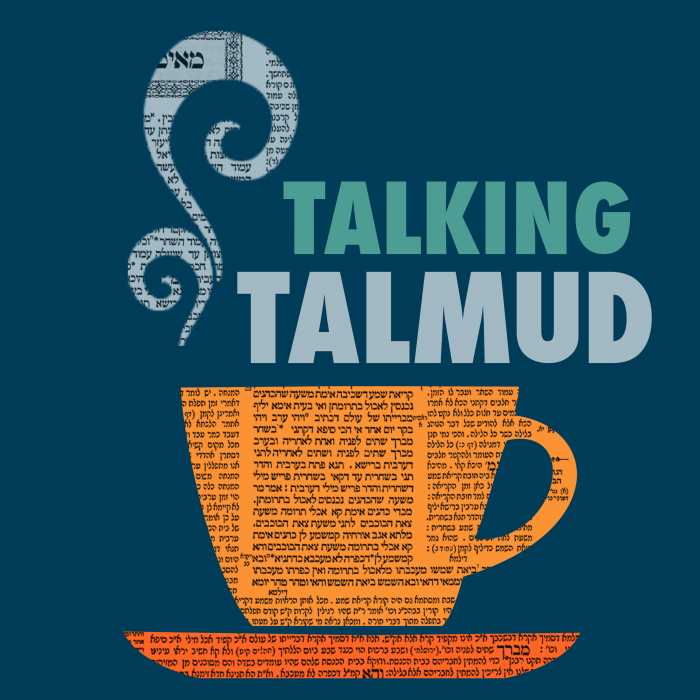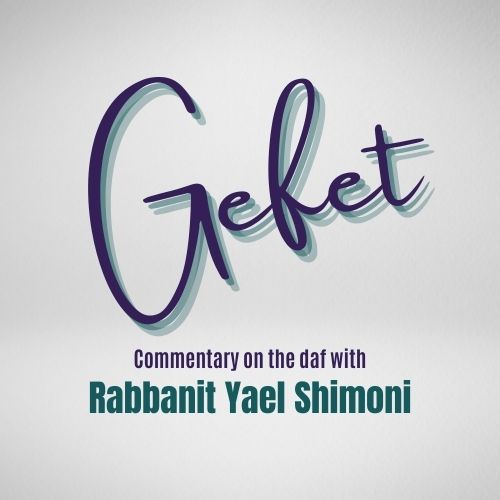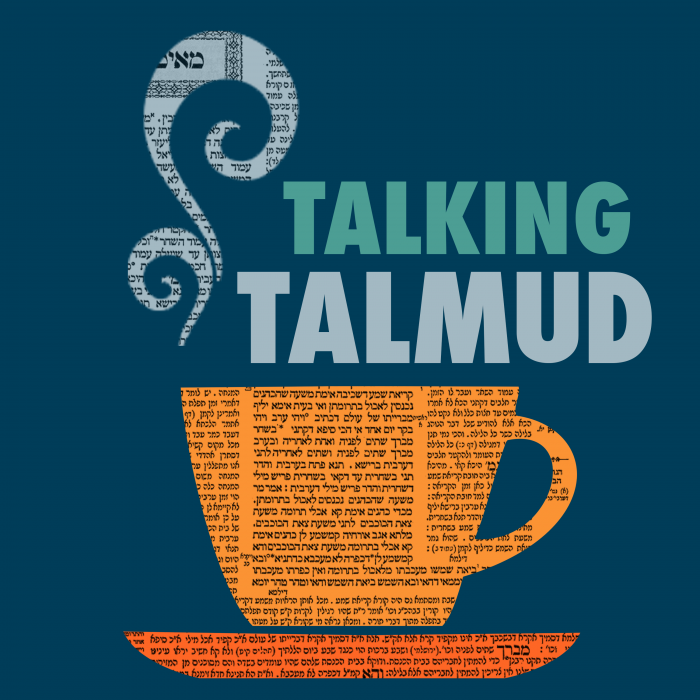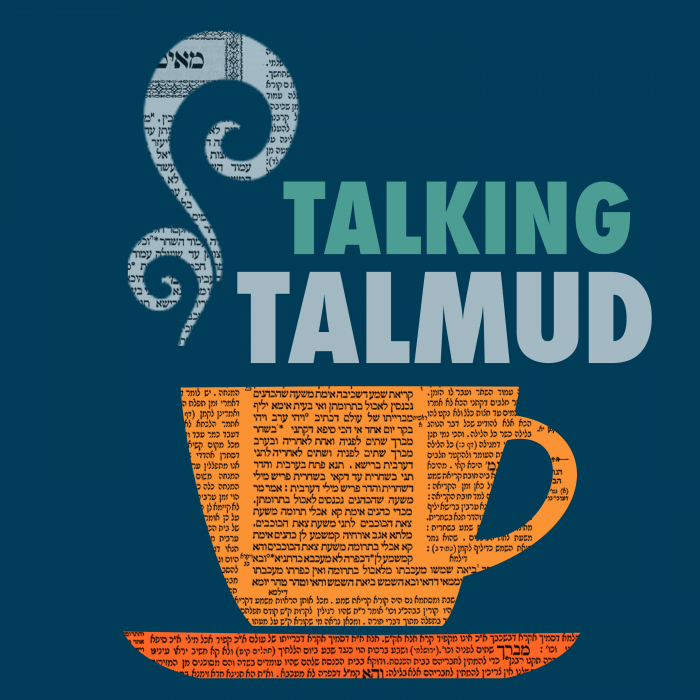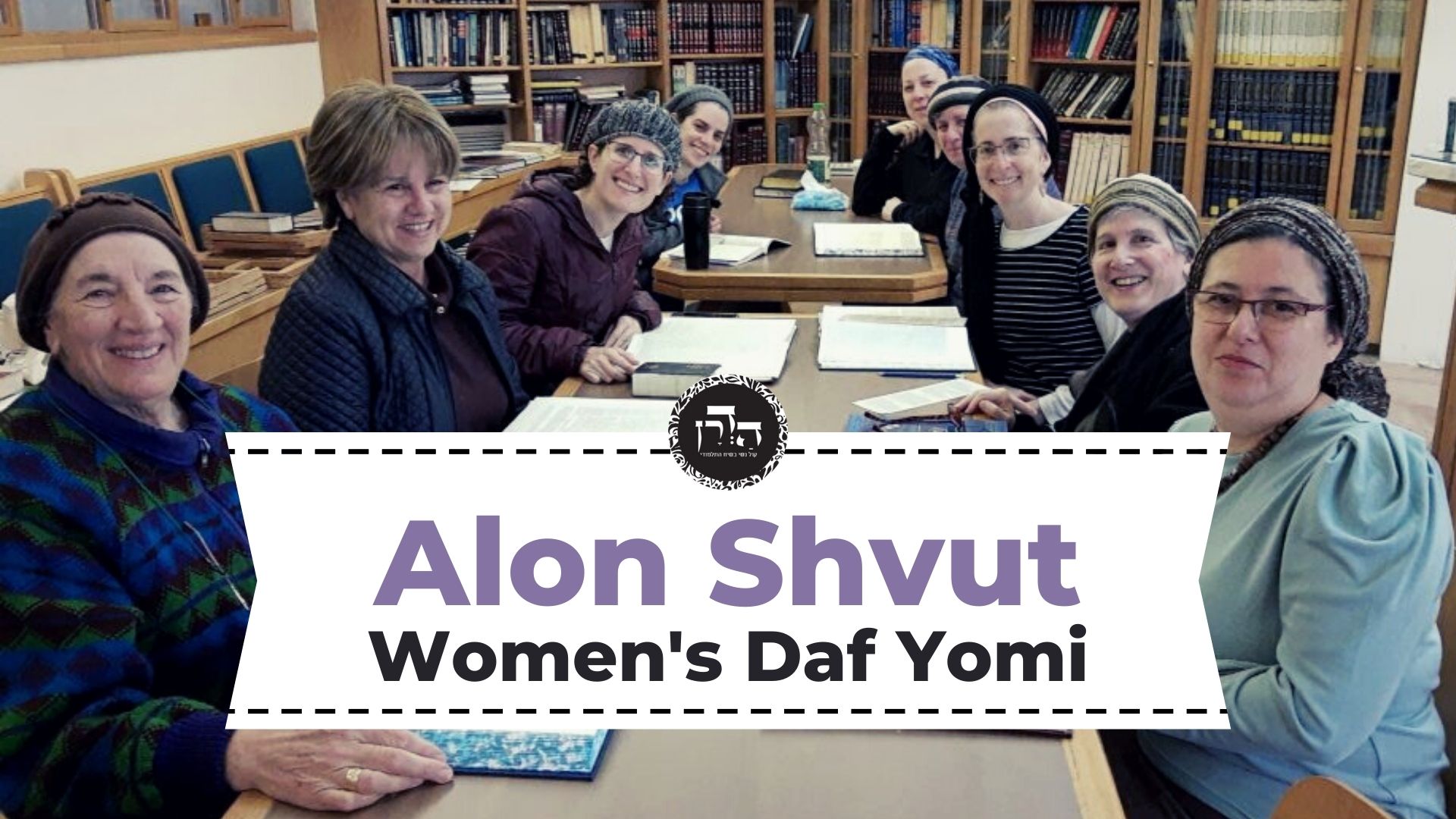The gemara brings cases where one can eat one piece of meat or sleep with one woman and be obligated to bring many sacrifices. Even though generally a prohibition can’t be added to another prohibition, there are exceptions to the rule where it can – if both prohibitions come at the same time, or if the prohibition is expanded or more inclusive.
This month’s learning is dedicated to the refuah shleima of our dear friend, Phyllis Hecht, גיטל פעשא בת מאשה רחל by all her many friends who love and admire her. Phyllis’ emuna, strength, and positivity are an inspiration.
Want to dedicate learning? Get started here:


Today’s daily daf tools:
This month’s learning is dedicated to the refuah shleima of our dear friend, Phyllis Hecht, גיטל פעשא בת מאשה רחל by all her many friends who love and admire her. Phyllis’ emuna, strength, and positivity are an inspiration.
Today’s daily daf tools:
Delve Deeper
Broaden your understanding of the topics on this daf with classes and podcasts from top women Talmud scholars.
New to Talmud?
Check out our resources designed to help you navigate a page of Talmud – and study at the pace, level and style that fits you.
The Hadran Women’s Tapestry
Meet the diverse women learning Gemara at Hadran and hear their stories.
Keritot 14
גְּמָ׳ נֵימָא אִית לֵיהּ לְרַבִּי מֵאִיר אִיסּוּר חָל עַל אִיסּוּר? נְהִי דְּאִיסּוּר חָל עַל אִיסּוּר לֵית לֵיהּ, אִיסּוּר כּוֹלֵל וְאִיסּוּר מוֹסִיף אִית לֵיהּ.
GEMARA: The Gemara suggests: Let us say that it is evident from the mishna that Rabbi Meir holds that a prohibition takes effect where another prohibition already exists. The Gemara counters: Although he does not generally hold that a prohibition takes effect where another prohibition already exists, with regard to a more inclusive prohibition and an expanded prohibition, he holds that the second prohibition does take effect where a prohibition already exists. Under certain circumstances a second prohibition takes effect, and under other circumstances it does not. When the second prohibition is an expanded or inclusive prohibition, it takes effect.
טָהוֹר, מֵעִיקָּרָא לָא אֲסִיר אֶלָּא בְּחֵלֶב, הֲוָה לֵיהּ טָמֵא, מִיגּוֹ דַּאֲסִיר בַּחֲתִיכוֹת טְהוֹרוֹת – אִיתּוֹסַף בֵּיהּ נָמֵי אִיסּוּרָא עִילָּוֵי חֵלֶב.
Therefore, in the case in the mishna of a ritually impure person who ate leftover forbidden fat from an offering, one who was initially pure was prohibited from eating the food only due to the prohibition of forbidden fat. Once the person became impure, since he became prohibited from eating even pure pieces of sacrificial meat, an additional prohibition is also added to the forbidden fat. The prohibition against an impure person eating sacrificial meat is considered an inclusive prohibition, and therefore it takes effect even though the prohibition against eating forbidden fat already applied.
וְחֵלֶב מֵעִיקָּרָא לָא אֲסִיר אֶלָּא בַּאֲכִילָה, אַקְדְּשֵׁיהּ, מִיגּוֹ דְּאִיתּוֹסַף בֵּיהּ אִיסּוּרָא דַּהֲנָאָה – אִיתּוֹסַף בֵּיהּ לְגַבֵּי חֵלֶב.
And likewise, the forbidden fat was initially forbidden only in consumption. When he consecrated the animal, it became prohibited to derive benefit from it in any manner. Therefore, since the prohibition against deriving any form of benefit was added to it, it was also added with regard to eating the forbidden fat. Consequently, the prohibition against misusing consecrated property, which is an expanded prohibition, applies even to one who eats the forbidden fat.
וְאַכַּתִּי לְהֶדְיוֹט הוּא דַּאֲסִיר אֲבָל לְגָבוֹהַּ שְׁרֵי, הֲוָה לֵיהּ נוֹתָר, מִיגּוֹ דְּאִיתּוֹסַף אִיסּוּרָא לְגַבֵּי גָּבוֹהַּ – אִיתּוֹסַף בֵּיהּ לְגַבֵּי הֶדְיוֹט. חָל עֲלֵיהּ יוֹם הַכִּפּוּרִים, מִיגּוֹ דְּאִיתּוֹסַף בֵּיהּ אִיסּוּר לְגַבֵּי חוּלִּין – אִיתּוֹסַף בֵּיהּ לְגַבֵּי גָבוֹהַּ.
And still, the consecrated forbidden fat is prohibited only to an ordinary person, but it is permitted to the Most High, i.e., the altar. When it becomes leftover, since a prohibition was added with regard to the Most High, as it is now prohibited to sacrifice it upon the altar, the expanded prohibition of leftover sacrificial meat is added with regard to an ordinary person as well. If Yom Kippur, during which the person is prohibited from eating anything, takes effect with regard to it, since a prohibition was added with regard to eating non-sacred food, a prohibition is also added with regard to food that had been consecrated to the Most High. The prohibition against eating on Yom Kippur is an inclusive prohibition, and therefore it takes effect even with regard to eating leftover sacrificial meat.
וְנִתְנֵי: חָמֵשׁ חַטָּאוֹת, וְנוֹקְמַהּ כְּגוֹן דַּאֲכַל כְּזַיִת פִּיגּוּל! בַּחֲדָא בְּהֵמָה קָמַיְירֵי, בִּשְׁתֵּי בְּהֵמוֹת לָא קָמַיְירֵי, וְנוֹתָר וּפִיגּוּל בַּחֲדָא בְּהֵמָה לָא מַשְׁכַּחַתְּ לַהּ.
The Gemara objects: And let the mishna teach: There is a case where one can perform a single act of eating an olive-bulk of food and be liable to bring five sin offerings, rather than four, and interpret it as a case where he ate an olive-bulk from an offering that was sacrificed with the intent to consume it after its appointed time [piggul]. The Gemara explains: The mishna is referring to a case of one animal, but is not referring to a case of two animals, and you do not find a case where the prohibitions of leftover sacrificial meat [notar] and piggul apply to one animal. From the moment an offering is rendered piggul it may not be sacrificed or eaten, and therefore it is not subject to the prohibition of notar.
אַלְּמָה לָא? מַשְׁכַּחַתְּ לַהּ כְּגוֹן שֶׁהֶעֱלָה אֵבֶר פִּיגּוּל לְגַבֵּי מִזְבֵּחַ, דְּפָקַע פִּיגּוּלֵיהּ מִינֵּיהּ וְהָוֵה לֵיהּ נוֹתָר,
The Gemara asks: Why is it not possible for the prohibitions of notar and piggul to apply to the same animal? You find it in a case where one brought upon the altar a limb from an offering that was piggul, as from that time its piggul status has been abrogated, and it becomes notar once the time that it may be sacrificed has passed.
וְכִדְאָמַר עוּלָּא: קוֹמֶץ פִּיגּוּל שֶׁהֶעֱלָה לְגַבֵּי מִזְבֵּחַ – פָּקַע פִּיגּוּלוֹ מִמֶּנּוּ וְהָוֵה לֵיהּ נוֹתָר. בְּאֵבֶר אֶחָד קָא מַיְירֵי, בִּשְׁנֵי אֵבָרִים לָא קָמַיְירֵי, וְנוֹתָר וּפִיגּוּל בְּחַד אֵבֶר לָא מַשְׁכַּחַתְּ לַהּ.
And this is as Ulla says: In the case of a handful of a meal offering that is piggul that one brought upon the altar, its piggul status has been abrogated and it becomes leftover. Consequently, he is liable with regard to the limb that was offered for violating the prohibition of notar, and is liable with regard to the rest of the animal for violating the prohibition of piggul. The Gemara answers: The mishna is referring to one limb, but it is not referring to two limbs, and you do not find notar and piggul with regard to one limb.
אַלְּמָה לָא? מַשְׁכַּחַתְּ לַהּ כְּגוֹן שֶׁהֶעֱלָה אֵבֶר פִּיגּוּל לְגַבֵּי מִזְבֵּחַ, דְּפַלְגֵיהּ אַנְּחֵיהּ עַל גַּבֵּי מִזְבֵּחַ, וּפַלְגֵיהּ מֵאַבָּרַאי דְּמִזְבֵּחַ, דְּהָהוּא דְּמִזְבֵּחַ פָּקַע פִּיגּוּל וַהֲוָה לֵיהּ נוֹתָר, וְכִדְאָמַר עוּלָּא: קוֹמֶץ פִּיגּוּל שֶׁהֶעֱלָה עַל הַמִּזְבֵּחַ – פָּקַע פִּיגּוּלוֹ מִמֶּנּוּ וְהָוֵי לֵיהּ נוֹתָר!
The Gemara asks: Why is there no such case? You find it in a situation where one brought a limb from a piggul offering upon the altar, and he placed half of it upon the altar and half of it outside of the altar. In such a case, with regard to that portion of the limb which he placed upon the altar, its piggul status has been abrogated and it becomes notar. And this is as Ulla says: In the case of a handful of a meal offering that is piggul that one brought upon the altar, its piggul status has been abrogated and it becomes notar. By contrast, the part of the limb that was not placed upon the altar retains its status as piggul.
אֲמַר לֵיהּ: לָא, אִי רוּבָּא דְּמִזְבֵּחַ – שִׁדְיֵיהּ לַמִּזְבֵּחַ, רוּבָּא דְּבָרַאי – שִׁדְיֵיהּ לְבָרַאי.
The Sage answering the question said to the questioner: No, the status of piggul cannot be abrogated from part of a limb. Rather, if the majority of the limb is on the altar, then throw it on the altar, i.e., the entire limb has the status of being on the altar. If the majority of the limb is outside the altar, throw it outside, i.e., it is considered as though the limb was not placed on the altar at all.
תִּפְשׁוֹט דְּבָעֵי רָמֵי בַּר חָמָא: הָלְכוּ בְּאֵבָרִים אַחַר הָרוֹב אוֹ לֹא! אֶלָּא, בִּכְזַיִת אֶחָד קָמַיְירֵי, בִּשְׁנֵי זֵיתִים לָא קָא מַיְירֵי.
The Gemara objects: If so, one can resolve the dilemma that Rami bar Ḥama raised: Does one follow the majority with regard to limbs or not? According to the previous interpretation of the mishna, one does follow the majority with regard to limbs. The Gemara explains: Rather, the reason that the mishna did not mention the prohibition of piggul is that it is referring to the consumption of one olive-bulk of forbidden fat, and is not referring to two olive-bulks. Even if parts of one limb can have the status of piggul and other parts can be leftover sacrificial meat, one single olive-bulk cannot have both statuses.
וְלָא? וְהָקָתָנֵי ״יוֹם הַכִּפּוּרִים״, וּבְיוֹם הַכִּפּוּרִים כּוֹתֶבֶת [הוּא] דְּמִחַיַּיב, וְכוֹתֶבֶת אִית בַּיהּ שְׁנֵי זֵיתִים!
The Gemara asks: And is the mishna not referring to a case of more than one olive-bulk? But isn’t it taught that one is liable to bring a sin offering for eating on Yom Kippur, and on Yom Kippur it is only eating the volume of a large date that obligates one to bring a sin offering, and the volume of a large date contains the volume of two olives?
אָמַר רַבִּי זֵירָא: כְּגוֹן שֶׁאָכַל כּוּלְיָא בְּחֶלְבָּהּ. רַב פָּפָּא אָמַר: כְּגוֹן דְּמַלְּיֵיהּ בְּתַמְרֵי.
Rabbi Zeira said: It is referring to a case where he eats a kidney with the fat attached to it. He is liable to bring three of the sin offerings enumerated in the mishna for eating the olive-bulk of fat, and the additional amount of kidney he eats brings his total consumption to the volume of a large date, so that he is liable for eating on Yom Kippur. Rav Pappa said: It is referring to a case where he ate an olive-bulk of the fat and completed the volume of a large date with dates.
רַב אַדָּא בַּר אַחָא מַתְנֵי ״חָמֵשׁ חַטָּאוֹת״, וּמְתָרֵיץ לַהּ: כְּגוֹן דַּאֲכַל כְּזַיִת פִּיגּוּל, וְלָא מְשַׁנֵּי כְּהָנֵי שִׁינּוּיֵי דְּקָא מְשַׁנֵּינַן.
Rav Adda bar Aḥa teaches that the mishna is stating that one can be liable to bring five sin offerings for one act of eating, not just four, and he interprets it to be referring to a case where one ate an olive-bulk of piggul from another animal together with the olive-bulk of forbidden fat, and he does not answer in accordance with these answers that we answered in the name of Rav Pappa and Rabbi Zeira.
וְנִתְנֵי: ״שֵׁשׁ חַטָּאוֹת״, וְנוֹקְמַהּ כְּגוֹן דַּאֲכַל כְּזַיִת דָּם! בַּחֲדָא אֲכִילָה קָא מַיְירֵי, בִּשְׁתֵּי אֲכִילוֹת לֹא קָא מַיְירֵי, וְשִׁיעֲרוּ חֲכָמִים דְּאֵין בֵּית הַבְּלִיעָה מַחֲזִיק יוֹתֵר מִשְּׁנֵי זֵיתִים.
The Gemara objects: And let the mishna teach that one can be liable to bring six sin offerings, and interpret it as referring to a case where he consumed an olive-bulk of blood in addition to the other two olive-bulks. The Gemara explains: The mishna is referring to one act of eating, but is not referring to two acts of eating, and the Sages calculated that one’s throat does not hold more than two olive-bulks at once.
רַבִּי מֵאִיר אוֹמֵר וְכוּ׳. וְנִתְנֵי: ״אִם הוֹצִיאוֹ – חַיָּיב״, מַאי טַעְמָא קָתָנֵי ״אִם הָיְתָה שַׁבָּת״? אָמַר רַפְרָם: זֹאת אוֹמֶרֶת: עֵירוּב וְהוֹצָאָה לְשַׁבָּת, וְאֵין עֵירוּב וְהוֹצָאָה לְיוֹם הַכִּפּוּרִים.
§ The mishna teaches that Rabbi Meir says: If it was Shabbat and he carried it out from the private domain into the public domain while eating it, he would be liable to bring a sin offering for performing a prohibited labor on Shabbat. The Gemara objects: And let the mishna teach: If he carried it out he is liable, as the mishna is referring to one who ate on Yom Kippur, which is also a day when labor is prohibited. What is the reason that it teaches: If it was Shabbat and he carried it out he is liable? Why mention Shabbat at all? Rafram said: That is to say that the joining of courtyards in order to permit carrying, and the general prohibition against carrying from one domain to another, apply with regard to Shabbat, but the joining of courtyards and the prohibition against carrying do not apply with regard to Yom Kippur.
מִמַּאי? דִּלְמָא יֵשׁ עֵירוּב וְהוֹצָאָה לְיוֹם הַכִּפּוּרִים, וְהָכִי קָתָנֵי: אִם הָיְתָה שַׁבָּת וְהוֹצִיאוֹ – חַיָּיב אַף מִשּׁוּם שַׁבָּת וְיוֹם הַכִּפּוּרִים!
The Gemara asks: From where is this conclusion derived? Perhaps the joining of courtyards and the prohibition against carrying do apply to Yom Kippur, and this is what the mishna is teaching: If it was Shabbat and he carried it out from one domain to another he is liable due to the prohibition against carrying on Shabbat and also due to the prohibition against carrying on Yom Kippur.
אֶלָּא אִי אִיתְּמַר דְּרַפְרָם עַל הָדָא אִיתְּמַר, דְּתַנְיָא: ״וְשִׁלַּח בְּיַד אִישׁ עִתִּי״, ״אִישׁ״ – לְהַכְשִׁיר אֶת הַזָּר. ״עִתִּי״ – אֲפִילּוּ בְּטוּמְאָה וַאֲפִילּוּ בְּשַׁבָּת, ״עִתִּי״ – בִּמְזוּמָּן.
Rather, if the statement of Rafram was stated, it was stated with regard to this case, as it is taught in a baraita: The verse states with regard to the scapegoat of Yom Kippur: “And he shall send it away with an appointed man into the wilderness” (Leviticus 16:21). The word “man” is mentioned in order to render a non-priest fit for this task. The term “appointed” indicates that the scapegoat is always sent away at the appropriate time, even when the appointed man is in a state of ritual impurity, and even when Yom Kippur occurs on Shabbat. In addition, the word “appointed” is referring to one who was designated for the task the day before.
קָתָנֵי: ״עִתִּי״ – אֲפִילּוּ בְּשַׁבָּת, אָמַר רַפְרָם: זֹאת אוֹמֶרֶת עֵירוּב וְהוֹצָאָה לְשַׁבָּת, וְאֵין עֵירוּב וְהוֹצָאָה לְיוֹם הַכִּפּוּרִים.
The baraita taught that the word “appointed” indicates that the scapegoat is sent away even on Shabbat, and in this context Rafram says: That is to say that the joining of courtyards and the prohibition against carrying apply with regard to Shabbat, but the joining of courtyards and the prohibition against carrying do not apply with regard to Yom Kippur.
מִמַּאי? שָׁאנֵי שָׂעִיר הַמִּשְׁתַּלֵּחַ, דְּהֶכְשֵׁירוֹ בְּיוֹם הַכִּפּוּרִים בְּכָךְ! אֶלָּא דְּרַפְרָם בְּרוּתָא הִיא.
The Gemara objects to Rafram’s inference: From where does he cite proof for this inference? The case of the scapegoat is different, as its validity on Yom Kippur is in this manner. Even if the prohibition against carrying does apply on Yom Kippur, the Torah explicitly commanded that the scapegoat be sent away on that day, and therefore it is permitted. Rather, the statement cited in the name of Rafram is an error [beruta], and it was not actually stated in the study hall.
מַתְנִי׳ יֵשׁ בָּא בִּיאָה אַחַת וְחַיָּיב עָלֶיהָ שֵׁשׁ חַטָּאוֹת, כֵּיצַד? הַבָּא עַל בִּתּוֹ חַיָּיב עָלֶיהָ מִשּׁוּם בִּתּוֹ, וַאֲחוֹתוֹ, אֵשֶׁת אָחִיו, וְאֵשֶׁת אֲחִי אָבִיו, וְאֵשֶׁת אִישׁ, וְנִדָּה.
MISHNA: There is a case where one can engage in a single act of intercourse and be liable to bring six sin offerings for it. How so? It is possible for one who engages in intercourse with his daughter to be liable due to having violated the prohibitions of engaging in intercourse with his daughter, his sister, the wife of his brother, the wife of his father’s brother, a married woman, and a menstruating woman.
גְּמָ׳ וְהָא לֵית לֵיהּ לְרַבִּי מֵאִיר אִיסּוּר חָל עַל אִיסּוּר! נְהִי דְּאִיסּוּר חָל עַל אִיסּוּר לֵית לֵיהּ, אִיסּוּר מוֹסִיף וְאִיסּוּר כּוֹלֵל אִית לֵיהּ.
GEMARA: The Gemara asks: How could one become liable to bring multiple sin offerings? But Rabbi Meir does not hold that a prohibition takes effect where another prohibition already exists. The Gemara answers: Although he generally does not hold that a prohibition takes effect where another prohibition already exists, with regard to an expanded prohibition and a more inclusive prohibition, he does hold that it takes effect where another prohibition already exists.
כְּגוֹן שֶׁבָּא עַל אִמּוֹ וְהוֹלִיד בַּת, דְּאִיסּוּר בִּתּוֹ וַאֲחוֹתוֹ בַּהֲדֵי הֲדָדֵי אָתֵי. נִשֵּׂאת לְאָחִיו, מִיגּוֹ דְּאִיתּוֹסַף אִיסּוּר לְגַבֵּי אַחִין – אִיתּוֹסַף אִיסּוּרָא לְגַבֵּי דִּידֵיהּ.
Consequently, the ruling stated in the mishna applies in a case where one engaged in intercourse with his mother and thereby fathered a daughter, so that the prohibitions against engaging in intercourse with his daughter and with his sister come into effect simultaneously. If that daughter married his brother, then since a prohibition was added with regard to his other brothers, to whom she has now become forbidden, it is an expanded prohibition, and therefore a further prohibition is added with regard to him as well.
נִשֵּׂאת לַאֲחִי אָבִיו, מִיגּוֹ דְּאִיתּוֹסַף אִיסּוּרָא לְגַבֵּי שְׁאָר אֲחֵי אָבִיו – אִיתּוֹסַף לְגַבֵּי דִּידֵיהּ. הָוְיָא לַהּ אֵשֶׁת אִישׁ, מִיגּוֹ דְּאִיתּוֹסַף אִיסּוּר לְגַבֵּי עָלְמָא – אִיתּוֹסַף נָמֵי לְגַבֵּי דִּידֵיהּ. הָוְיָא לַהּ נִדָּה, מִיגּוֹ דְּאִיתּוֹסַף אִיסּוּר לְגַבֵּי בַּעֲלַהּ – אִיתּוֹסַף נָמֵי לְגַבֵּי דִּידֵיהּ.
If she later married his father’s brother, then since a prohibition is added with regard to the sons of his father’s other brothers, a prohibition is also added with regard to him. If she becomes, or remains, a married woman, since a prohibition is added with regard to every man in the world other than her husband, a prohibition is added with regard to him as well. If she then becomes a menstruating woman, since a prohibition is added with regard to her husband, a prohibition is added with regard to him as well.
מַתְנִי׳ הַבָּא עַל בַּת בִּתּוֹ – חַיָּיב עָלֶיהָ מִשּׁוּם בַּת בִּתּוֹ, וְכַלָּתוֹ, וְאֵשֶׁת אָחִיו, וְאֵשֶׁת אֲחִי אָבִיו, וַאֲחוֹת אִשְׁתּוֹ, וְאֵשֶׁת אִישׁ, וְנִדָּה. רַבִּי יוֹסֵי אוֹמֵר: אִם עָבַר זָקֵן וּנְשָׂאָהּ – חַיָּיב עָלֶיהָ מִשּׁוּם אֵשֶׁת אָב.
MISHNA: It is possible for one who engages in intercourse with his daughter’s daughter to be liable to bring sin offerings due to the unwitting violation of the prohibitions of engaging in intercourse with his daughter’s daughter, and his daughter-in-law, and the wife of his brother, and the wife of his father’s brother, and his wife’s sister, and a married woman, and a menstruating woman. Rabbi Yosei says: If the elder, i.e., the man’s father, who is the woman’s great-grandfather, transgressed and married her, the man would also be liable for engaging in intercourse with her due to the prohibition of intercourse with the wife of his father.
וְכֵן הַבָּא עַל בַּת אִשְׁתּוֹ, וְעַל בַּת בִּתָּהּ.
And likewise, it is possible for one who engages in intercourse with the daughter of his wife to be liable to bring six sin offerings, similar to one who engages in intercourse with his own daughter, for violating the prohibitions against engaging in intercourse with his wife’s daughter, his sister, the wife of his brother, the wife of his father’s brother, a married woman, and a menstruating woman. And it is possible for one who engages in intercourse with his wife’s daughter’s daughter to be liable to bring seven sin offerings, similar to one who engages in intercourse with his own daughter’s daughter, for violating the following prohibitions: Engaging in intercourse with his wife’s daughter’s daughter, his daughter-in-law, the wife of his brother, the wife of his father’s brother, his wife’s sister, a married woman, and a menstruating woman.
גְּמָ׳ קָתָנֵי: חַיָּיב עָלֶיהָ מִשּׁוּם אֵשֶׁת אָב. מִי שַׁרְיָא לֵיהּ? אָמַר רַבִּי יוֹחָנָן: כְּגוֹן שֶׁנָּפְלָה לוֹ לְיִבּוּם.
GEMARA: It is taught in the mishna that Rabbi Yosei says: If the elder, i.e., the man’s father, who is the woman’s great-grandfather, transgressed and married her, the man would also be liable for engaging in intercourse with her due to the prohibition against engaging in intercourse with the wife of his father. The Gemara asks: Is she permitted to marry the man’s father? She had already been married to the man’s father’s brother, and therefore even if she was widowed or divorced from him, marriage would not even take effect with the man’s father, to whom she is forbidden as the wife of his brother. Rabbi Yoḥanan said: The marriage can take effect in a case where she happened to become designated to him for levirate marriage, when his brother died without children.
אִי הָכִי, מַאי ״עָבַר״? אָמַר רַבִּי יַעֲקֹב: שֶׁעָבַר מִשּׁוּם כַּלַּת בְּנוֹ, שְׁנִיָּה.
The Gemara raises an objection: If so, that they were married legitimately through levirate marriage, what is the reason for Rabbi Yosei’s statement that he transgressed and married her? Rabbi Ya’akov said: It means that he transgressed by marrying her due to her status as his son’s daughter-in-law, which renders her a secondary relative, forbidden to him by rabbinic law, albeit not by Torah law. Consequently, it was prohibited for him to enter into the levirate marriage.
כִּדְתַנְיָא: כַּלָּתוֹ עֶרְוָה, כַּלַּת בְּנוֹ שְׁנִיָּה. וְכֵן אַתָּה מוֹצֵא בְּבַת בְּנוֹ, וּבְבַת בֶּן בְּנוֹ. עַד סוֹף כׇּל הַדּוֹרוֹת.
This is as it is taught in a baraita: One’s daughter-in-law is a forbidden relative by Torah law, and his son’s daughter-in-law is a secondary relative, prohibited to him by rabbinic law, and similarly, you find with regard to the daughter of his son, who is prohibited to him by Torah law, and with regard to the daughter of his son’s son, until the end of all generations; the daughter of his son’s son, or of his son’s grandson, etc. They are all secondary relatives, prohibited to him by rabbinic law.
וּמִי אִית לֵיהּ לְרַבִּי יוֹסֵי אִיסּוּר חָל עַל אִיסּוּר? וְהָא תְנַן: עָבַר עֲבֵירָה שֶׁיֵּשׁ בָּהּ שְׁתֵּי מִיתוֹת – נִידּוֹן בַּחֲמוּרָה. רַבִּי יוֹסֵי אוֹמֵר: נִידּוֹן בְּזִיקָּה רִאשׁוֹנָה שֶׁבָּאָה עָלָיו.
The Gemara asks: And is Rabbi Yosei of the opinion that a prohibition takes effect where another prohibition already exists? But didn’t we learn in a mishna (Sanhedrin 81a): If one violated a transgression that renders him liable to two death penalties, he is sentenced to the harsher one. Rabbi Yosei says: He is sentenced according to the first prohibition that applied to him.
וְתַנְיָא: כֵּיצַד אָמַר רַבִּי יוֹסֵי נִידּוֹן בְּזִיקָּה רִאשׁוֹנָה? חֲמוֹתוֹ וְנַעֲשֵׂת אֵשֶׁת אִישׁ – נִידּוֹן מִשּׁוּם חֲמוֹתוֹ.
And it is taught in a baraita: In what case did Rabbi Yosei say that he is sentenced according to the first prohibition that applied to him? If his mother-in-law was widowed or divorced, and therefore forbidden to him only due to her status as his mother-in-law, and later she married and became forbidden as a married woman, and he engaged in intercourse with her, then he is sentenced to death by burning due to his violation of the prohibition proscribing intercourse with his mother-in-law, as this was the first prohibition to take effect.
אֵשֶׁת אִישׁ וְנַעֲשֵׂת חֲמוֹתוֹ – נִידּוֹן מִשּׁוּם אֵשֶׁת אִישׁ!
By contrast, if she was a married woman, and then he married her daughter and she thereby became his mother-in-law, and he subsequently engaged in intercourse with her, he is sentenced to death by strangulation due to his violation of the prohibition against engaging in intercourse with a married woman, despite the fact that burning is considered the more severe death penalty. This proves that Rabbi Yosei maintains that a prohibition does not take effect where another prohibition already exists.
אָמַר רַבִּי אֲבָהוּ: מוֹדֶה רַבִּי יוֹסֵי בְּאִיסּוּר מוֹסִיף. וְכֵן כִּי אֲתָא רָבִין אָמַר רַבִּי יוֹחָנָן: מוֹדֶה רַבִּי יוֹסֵי בְּאִיסּוּר מוֹסִיף.
Rabbi Abbahu said: Rabbi Yosei concedes that in the case of an expanded prohibition it takes effect even when another prohibition already exists. Consequently, he maintains in the mishna that the prohibition against intercourse with the wife of his father applies in addition to the previously existing prohibitions. And similarly, when Ravin came from Eretz Yisrael he said that Rabbi Yoḥanan says: Rabbi Yosei concedes with regard to an expanded prohibition.
מַאי אִיסּוּר מוֹסִיף אִיכָּא הָכָא? דְּאִיכָּא בְּרָא לְסָבָא, מִיגּוֹ דְּאִיתּוֹסַף אִיסּוּרָא לְגַבֵּי בְּרֵיהּ – אִיתּוֹסַף אִיסּוּרָא לְגַבֵּי דִּידֵיהּ.
The Gemara asks: What expanded prohibition is there here? The Gemara answers: The expanded prohibition applies when there is another son of the grandfather, i.e., another son of the father of the subject of the mishna. Consequently, since a prohibition against intercourse with the woman is added with regard to his father’s other son, when his father marries this woman, another prohibition against intercourse with her is added with regard to him as well.
מַתְנִי׳ הַבָּא עַל חֲמוֹתוֹ חַיָּיב עָלֶיהָ מִשּׁוּם חֲמוֹתוֹ, וְכַלָּתוֹ, וְאֵשֶׁת אָחִיו, וְאֵשֶׁת אֲחִי אָבִיו, וַאֲחוֹת אִשְׁתּוֹ, וְאֵשֶׁת אִישׁ, וְנִדָּה. וְכֵן הַבָּא עַל אֵם חָמִיו, וְעַל אֵם חֲמוֹתוֹ.
MISHNA: It is possible for one who engages in intercourse with his mother-in-law to be liable to bring seven sin offerings for doing so, due to the unwitting violation of the prohibitions of engaging in intercourse with his mother-in-law, and his daughter-in-law, and the wife of his brother, and the wife of his father’s brother, and his wife’s sister, and a married woman, and a menstruating woman. And likewise, the same applies with regard to one who engages in intercourse with the mother of his father-in-law or with the mother of his mother-in-law.
רַבִּי יוֹחָנָן בֶּן נוּרִי אוֹמֵר: הַבָּא עַל חֲמוֹתוֹ חַיָּיב עָלֶיהָ מִשּׁוּם חֲמוֹתוֹ, וְאֵם חֲמוֹתוֹ, וְאֵם חָמִיו. אָמְרוּ לוֹ: שְׁלׇשְׁתָּן שֵׁם אֶחָד הֵן.
Rabbi Yoḥanan ben Nuri says: It is possible for one who engages in intercourse with his mother-in-law to be liable due to the unwitting violation of the prohibitions of engaging in intercourse with his mother-in-law, and the mother of his mother-in-law, and the mother of his father-in-law. The Rabbis said to him: Those three prohibitions are all one category of prohibition, derived from the same verse: “You shall not uncover the nakedness of a woman and her daughter; you shall not take her son’s daughter, or her daughter’s daughter” (Leviticus 18:17). Consequently, one is not liable to bring separate sin offerings for violating these prohibitions.
גְּמָ׳ אָמַר רַבִּי אֶלְעָזָר אָמַר רַבִּי הוֹשַׁעְיָא: רַבִּי יוֹחָנָן בֶּן נוּרִי וְסוֹמְכוֹס אָמְרוּ דָּבָר אֶחָד. רַבִּי יוֹחָנָן בֶּן נוּרִי – הָא דַּאֲמַרַן. סוֹמְכוֹס מַאי הִיא? דִּתְנַן:
GEMARA: Rabbi Elazar says that Rabbi Hoshaya says: Rabbi Yoḥanan ben Nuri and Sumakhos said the same thing. With regard to Rabbi Yoḥanan ben Nuri, this is referring to that which we stated in the mishna. With regard to Sumakhos, what is the equivalent ruling that he stated? It is the following ruling, as we learned in a mishna (Ḥullin 82a):


